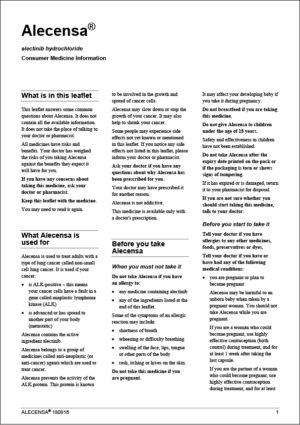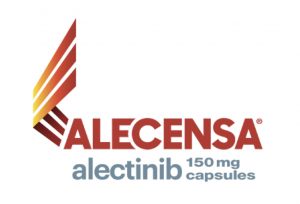Alecensa®
(alectinib)
Pronounced Al-ess-en-za
Alecensa, also known as alectinib, is a prescription medicine used to treat adults with a type of lung cancer called anaplastic lymphoma kinase positive (ALK+) non-small cell lung cancer (NSCLC).
About 5% of NSCLC cases are ALK+, which means there is a rearrangement in a gene called the ALK gene. This produces an abnormal type of protein that causes cells to grow and spread.
Alecensa belongs to a group of cancer medicines, called ALK inhibitors, that block ALK activity. It comes in the form of 150mg capsules and the recommended dosage is four capsules twice a day.
To find out more about ALK+ NSCLC, read articles and see stories of people with ALK+ NSCLC visit the Younity website here.
Have you been tested for ALK+ NSCLC?
To establish if an ALK mutation (gene rearrangement) is causing your lung cancer, your doctor needs to request a special type of genetic test designed to detect if the ALK gene rearrangement is present in your tumour. If the ALK gene rearrangement is detected, Alecensa is likely to be a suitable treatment for your cancer.
Not all patients in New Zealand with NSCLC are tested for the ALK rearrangement. If you’re not sure if you’ve had one of these tests, talk to your doctor who will be able to advise you.
To learn more about the tests and scans used in the diagnosis and treatment of ALK+ NSCLC visit the Younity website here.
Clinical trial data

In a large clinical trial called the ALEX study, Alecensa was compared to crizotinib (another medication used to treat ALK+ lung cancer), in people newly diagnosed with advanced or metastatic ALK+ NSCLC.
The study showed that people taking Alecensa, had their cancer controlled for more than 3 times as long (34.8 months), without growing or spreading, compared to the group taking crizontinib (10.9 months).
Alecensa was also able to shrink the size of tumours that had spread to the brain in 81% of patients, compared to 50% of patients using crizotinib.
In a large clinical trial called the ALINA study, Alecensa was compared to chemotherapy in people who had early ALK+ NSCLC removed by recent surgery. The treatment was given after surgery (adjuvant).
Over 2 years of follow-up the study showed that 93.8% of people treated with Alecensa did not have signs of their cancer compared to 63.0% of those taking chemotherapy.
Possible side effects of Alecensa
All medicines can have side effects. You’ll find a list of possible side effects in the Consumer Medicines Information here.
Always talk to your doctor if you have any questions or concerns.
For more information about how Alecensa works and what you can expect from treatment with Alecensa visit the Younity website here.
How to access Alecensa
Alecensa is fully funded by PHARMAC for patients with ALK-positive locally advanced or metastatic (spread to other parts of the body) NSCLC who meet pre-defined criteria.
Alecensa is not PHARMAC funded for early ALK-positive NSCLC patients following surgery (adjuvant treatment). This means patients in this group will have to pay for this medicine. Paying for treatment requires careful thought, but there are financial options that may help you fund private treatment.
Ready to take the next step?
Because every situation is different, it’s important to speak to your doctor to find out if Alecensa is right for you.
If you’re now considering treatment with Alecensa:
We’ve put together a discussion guide to help you begin a conversation with your doctor. Print it off, take it along to your next appointment, and take notes in the spaces provided.
Talking to your doctor about Alecensa
Handy resources

Alecensa Patient Booklet
DOWNLOAD

